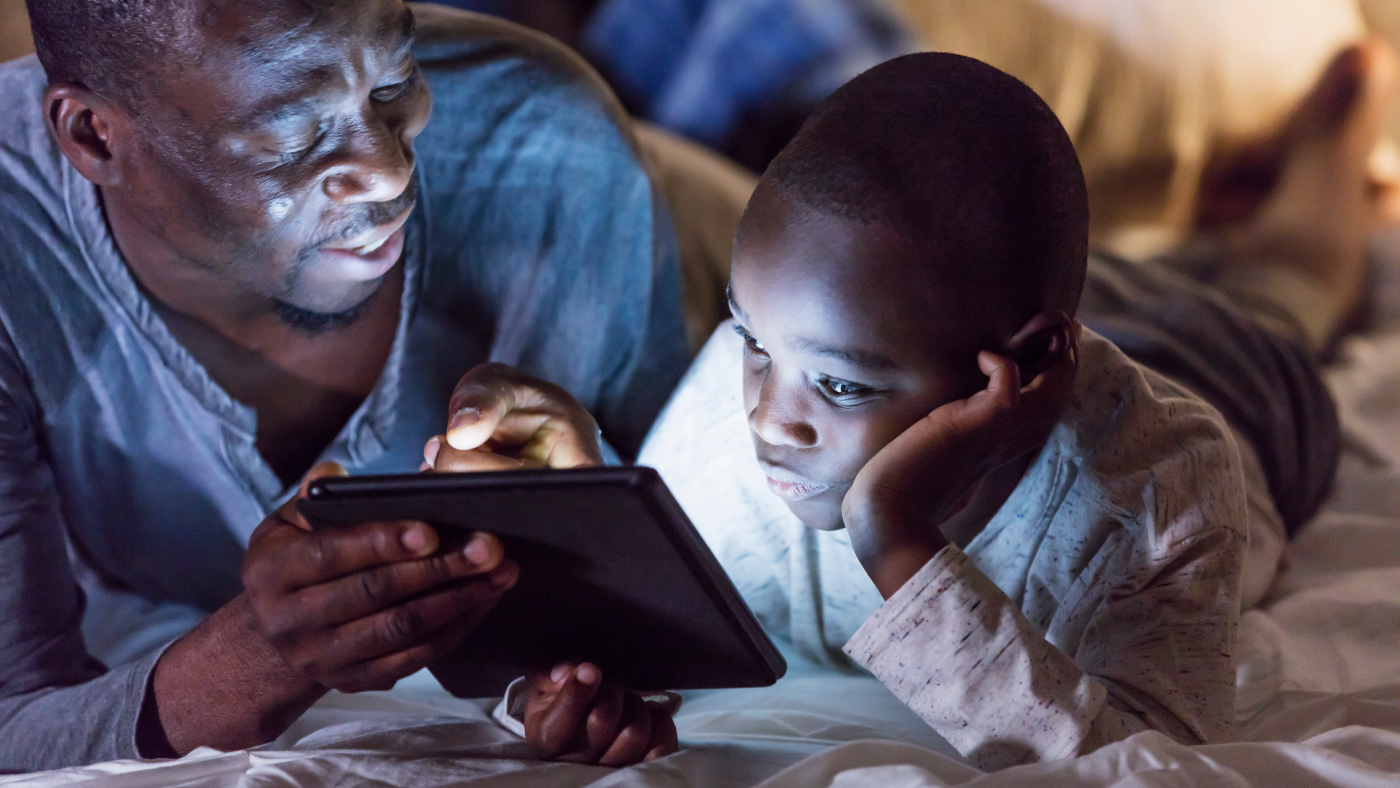
How we did this
Pew Research Center has long studied the changing nature of parenting and family dynamics as well as the adoption of digital technologies. This report focuses on how children engage with digital technologies, screens and social media, as well as parents’ attitudes about these behaviors, their concerns about their child’s use of technology, and their own assessment of their parenting and experiences with digital tech. These findings are based on a survey conducted March 2-15, among 3,640 U.S. parents who have at least one child or children ages 17 and under. This includes those who took part as members of Pew Research Center’s American Trends Panel (ATP), an online survey panel that is recruited through national, random sampling of residential addresses, as well as respondents from the Ipsos KnowledgePanel. The margin of sampling error for the full sample is plus or minus 2.2 percentage points.
Recruiting ATP panelists by phone or mail ensures that nearly all U.S. adults have a chance of selection. This gives us confidence that any sample can represent the whole U.S. adult population (see our Methods 101 explainer on random sampling). To further ensure that each ATP survey reflects a balanced cross section of the nation, the data is weighted to match the U.S. adult population by gender, race, ethnicity, partisan affiliation, education and other categories.
For more, see the report’s methodology about the project. You can also find the questions asked, and the answers the public provided in this topline.
Parenting has never been easy. But the widespread adoption of smartphones and the rise of social media has introduced a new wrinkle to the challenges of parenthood. In fact, a majority of parents in the United States (66%) – who include those who have at least one child under the age of 18, but who may also have an adult child or children – say that parenting is harder today than it was 20 years ago, with many in this group citing technology as a reason why, according to a Pew Research Center survey conducted in March.
One of the most highly discussed – and debated – topics among parents today is screen time. How much is too much? And what impact will screens have on children’s development? Amid these growing questions, the World Health Organization issued guidelines last year on the amount of time young children should spend in front of screens.
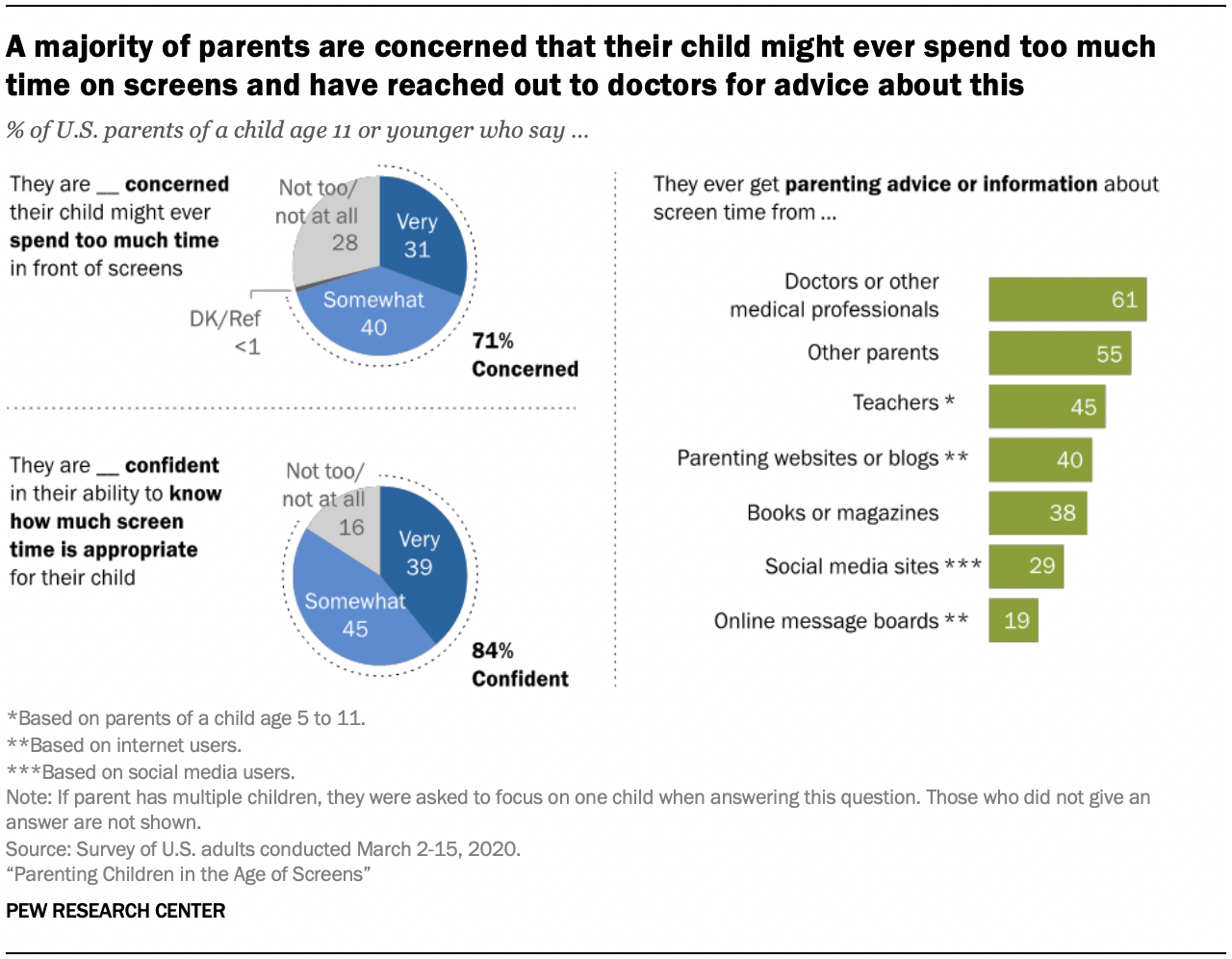
Parents with young children themselves make clear they are anxious about the effects of screen time. Fully 71% of parents of a child under the age of 12 say they are at least somewhat concerned their child might ever spend too much time in front of screens, including 31% who are very concerned about this.1 And some parents with a child in this age range already believe their child spends too much time on certain devices, including a smartphone. (It is important to note that this survey was fielded before the COVID-19 outbreak in the U.S. that closed many schools and led to widespread shutdowns and stay-at-home orders throughout the country.)
While a majority of parents with a young child say they are very (39%) or somewhat confident (45%) in knowing the appropriate amount of screen time for their child, they are also seeking out advice from others. Some 61% of parents of a child age 11 or younger say they have received advice or information about screen time from a doctor or other medical professional and 55% say the same about other parents, while 45% of parents of a child age 5 to 11 have turned to teachers for help.
Parents overall are also apprehensive about the long-term effects of smartphones on children’s development: 71% believe the widespread use of smartphones by young children might potentially result in more harm than benefits.
These worries come at a time when it is fairly common for children of all ages to engage – in some way – with digital devices.2 For example, 80% of parents say their child age 5 to 11 ever uses or interacts with a tablet computer, while 63% say the same about smartphones. For parents of children under the age of 5 those shares are also notable: 48% and 55%, respectively. At the same time, roughly one-third of parents of a child 11 or younger (36%) say their child ever uses or interacts with a voice-activated assistant, like Apple’s Siri or Amazon Alexa. But there are wide age gaps: parents who have an older child, between the ages of 5 and 11 (46%), are more likely than parents with a child age 3 to 4 (30%) or 2 or younger (14%) to say their child uses or interacts with this type of technology.
Terminology
Several terms used in this report are related to parents, age of children and the technology adoption practices of children. This reference guide explains each term.
Parent is used to refer to an adult who reports being a parent or guardian of at least one child under the age of 18, but who may also have an adult child or children.
Parents of a child age 11 or younger is used to refer to parents who report having a child age 11 or younger. In cases where families have more than one child in this age range, these questions asked the parents focus on one of those children, either their oldest or youngest child in this age range (based on random assignment).
Parents of a child age 4 or younger is used to refer to parents whose randomly assigned child is under the age of 5 (0 to 4).
Parents of a child age 5 to 11 is used to refer to parents whose randomly assigned child is between the ages of 5 and 11.
Young child is used to describe children under the age of 12.
Engagement and interaction with digital technology among children was measured by asking parents about the devices their child “uses or interacts with.”
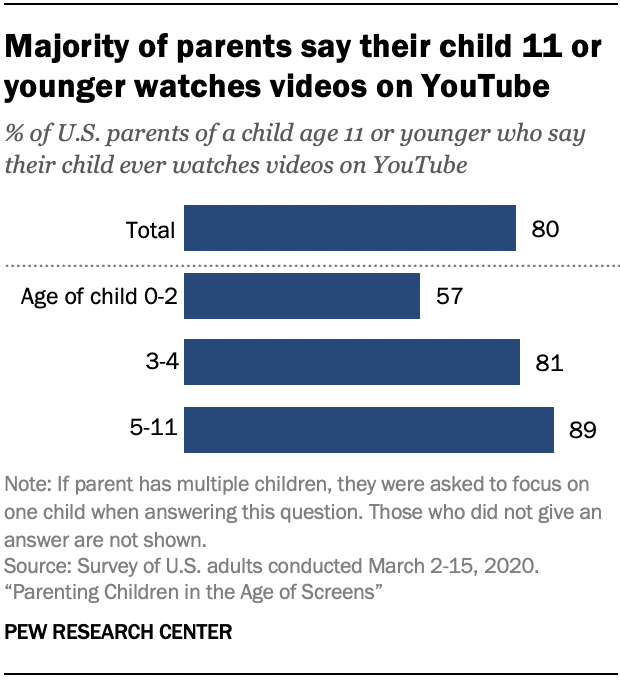
YouTube has emerged as a key platform for both younger and older kids. Fully 89% of parents of a child age 5 to 11 say their child watches videos on YouTube, as do 81% of those who have a child age 3 to 4 and 57% of those who have child age 2 or younger. And while majorities of parents whose child uses YouTube credit the platform for entertaining and educating their children, a majority of these parents are concerned about their child being exposed to inappropriate content on the video sharing site.
But the conversation around screen time is not limited to children. Parents themselves grapple with their own device distractions. When asked if they spend too much, too little or not enough time on their phone, more than half of parents overall (56%) say they spend too much time on their smartphone, while about seven-in-ten (68%) say they are at least sometimes distracted by their phone when spending time with their children.
These findings come from a nationally representative survey of 3,640 U.S. parents who have at least one child under the age of 18, but who may also have adult children, conducted online March 2-15, 2020, using Pew Research Center’s American Trends Panel and the Ipsos KnowledgePanel. The following are among the other major findings.
Many parents cite technology as a reason why parenting is harder today than in the past
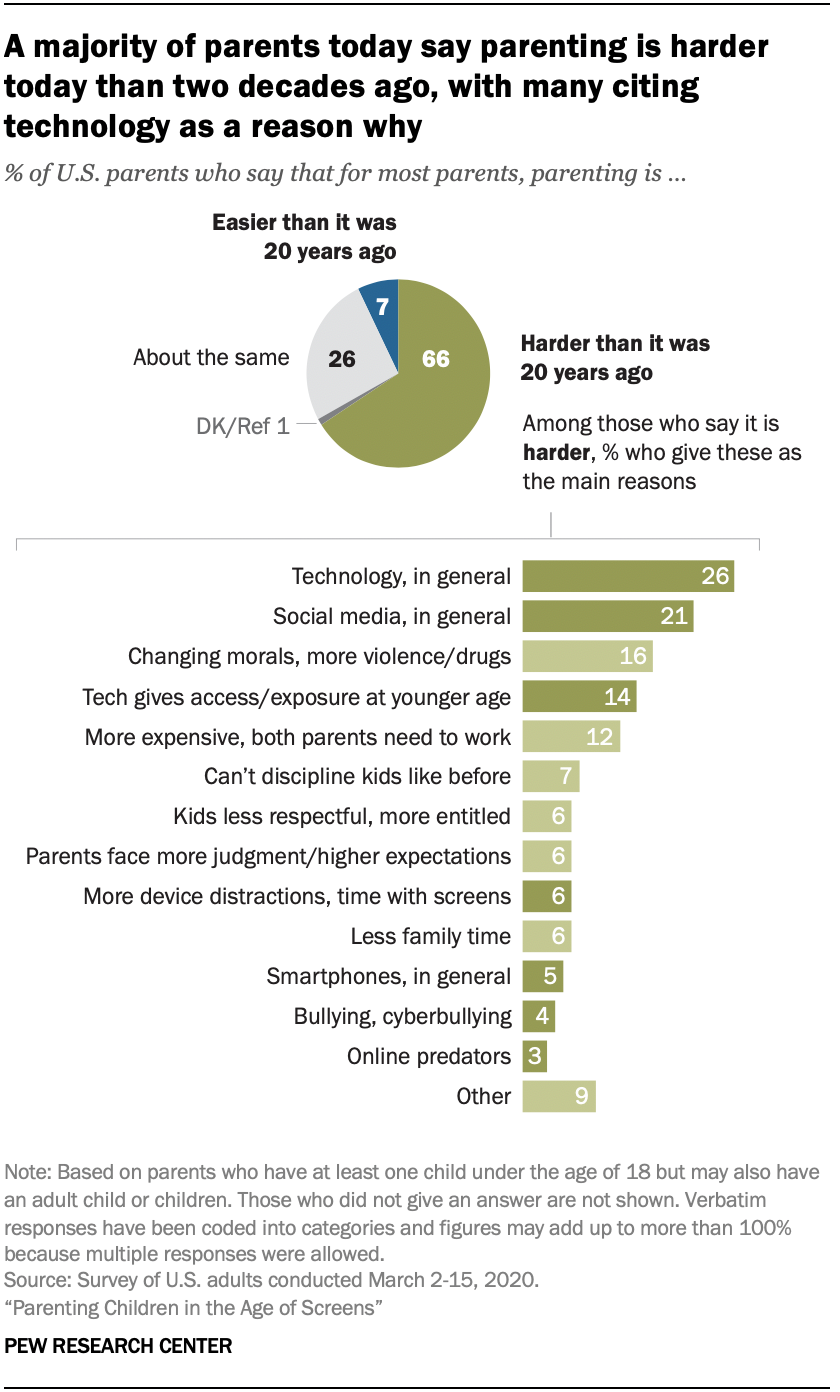
When asked whether parenting is harder, easier or about the same as it was 20 years ago, larger shares of parents (66%) – which includes those who have at least one child under the age of 18 – say they believe it is harder today for most parents. Meanwhile, just 7% think it is easier, while 26% believe parenting is about the same as it was two decades ago.
Across demographic groups, parents are more likely to say that parenting today is more difficult rather than easier when compared with the past, but there are some modest differences by age. About seven-in-ten parents ages 50 and older (71%) say parenting is harder today, versus 66% of 30- to 49-year-old parents and 60% of those ages 18 to 29.
Parents cite a number of different reasons why they think parenting has grown more difficult over the years. Some of the most common responses tend to stress the impact of digital technology (26%), the rise of social media (21%) and how access to technology exposes children to things at a young age (14%). Other commonly cited reasons for parenting growing more difficult include changing morals and values and the costs associated with raising a child.
Parents are wary of the impact of mobile devices, and relatively few think children under 12 should have their own smartphone
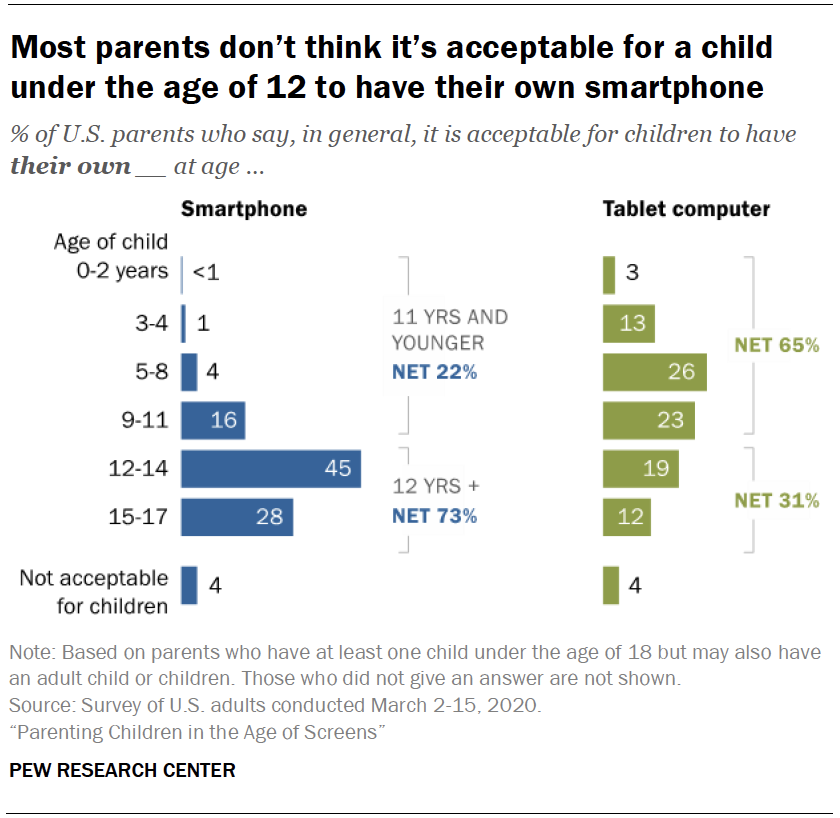
With many children having access to mobile devices, one of the questions posed to parents and experts alike is when it is acceptable for children to have their own smartphone or tablet computer.
The ages of 12 to 14 seem to be a major milestone in parents’ eyes for smartphones. This survey finds that a majority of parents (73%) believe it is acceptable for children to have their own phone only after they have reached at least the age of 12. Some 45% say smartphone ownership is acceptable between the ages of 12 and 14, and 28% say it is acceptable between the ages of 15 and 17. Just 22% think it is OK for a child under the age of 12 to have one.
When asked about the appropriate age for a child to have their own tablet, parents are more accepting of children having one at a younger age. Fully 65% of parents say it is acceptable for child to have their own tablet computer before the age of 12.
Parents who have at least one minor child but who may also have adult children weighed in on whether they thought the use of smartphones by young children would help or hurt their ability to do a variety of things such as develop healthy friendships or do well in school. Parents are concerned about the impact that smartphones could have on children’s interpersonal skills. Fully 71% of parents say the use of smartphones by children age 11 or younger will hurt their ability to learn effective social skills a lot or a little, while a similar share says the same about developing healthy friendships. Just over half of parents think these devices will hurt children’s ability to do well in school, while parents are more evenly split when it comes to how smartphones will impact children’s ability to be creative or pursue their hobbies and interests.
YouTube is widely used by children, with parents seeing both benefits and drawbacks to the platform
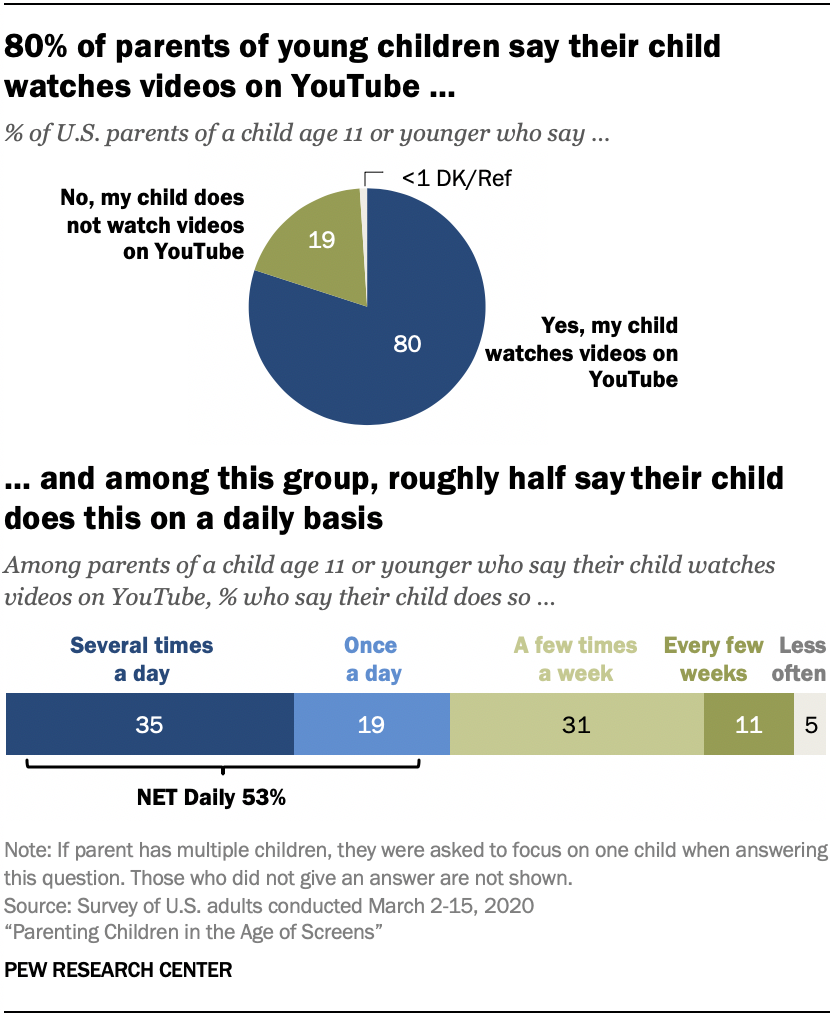
Aside from interactions with the devices themselves, children also engage with a range of platforms and websites, and YouTube has emerged as a key platform for kids.
A clear majority of parents who have a child age 11 or younger say this child ever watches videos on YouTube. Among parents who say their child watches videos this way, 53% say their child does this daily, including 35% who say their child watches these videos on the platform several times a day.
But these numbers vary significantly by race and ethnicity. Black (50%) or Hispanic parents (40%) who have a child in this age range who watches YouTube are more likely to say their child does this several times a day, compared with white parents (29%).
When it comes to their opinions about the video-sharing site, parents offer both positive and negative critiques of the platform. Fully 97% of parents whose child watches videos on YouTube say it keeps their child entertained, 88% believe it helps them learn new things, while 75% say the platform exposes their child to different cultures. Still, majorities of parents are concerned about the types of videos their child may encounter on YouTube, and some report that their child has come across unsuitable material. Some 46% say their child age 11 and younger who watches YouTube videos has encountered videos that were inappropriate for their age.3
Vast majority of parents say they limit when and how long their child can use screens, while digital ‘grounding’ is a relatively common practice for parents
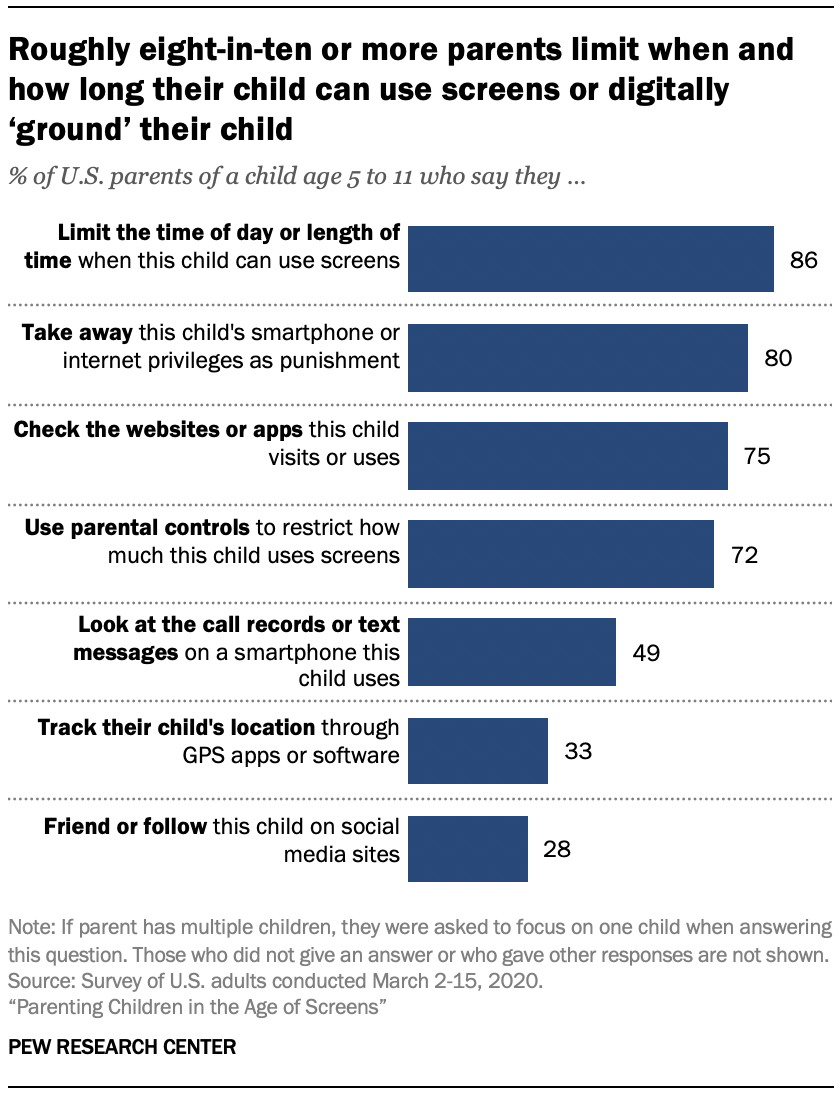
In addition to parents’ concerns about screen time, there are other tech-related worries that are on their minds. Majorities of parents say they are at least somewhat concerned about their child ever being the target of online predators, accessing sexually explicit content, accessing violent content online or ever being bullied or harassed online.
Amid these worries, parents report that they monitor their young child’s digital activities in a number of ways, with most limiting screen time and using digital “grounding” as a disciplinary tactic.
Fully 86% of parents of a child age 5 to 11 say they limit the time of day or length of time their child can use screens, while eight-in-ten say they take away their child’s smartphone or internet privileges as punishment. About three-quarters of parents of a child age 5 to 11 say they check the websites this child visits or the mobile apps they use (75%) and use parental controls to restrict how much this child uses screens (72%).
Roughly half of parents of a child in this age range (49%) say they look at the call records or text messages on a smartphone used by this child. Other forms of monitoring like tracking the location of their child through GPS apps or software (33%) or friending or following their child on social media (28%) are far less common.4
At the same time, more than half of parents of a child 11 or younger say they are at least somewhat concerned about their child ever being the target of online predators (63%), accessing sexually explicit content (60%) and accessing violent content online (59%). Somewhat similar shares (56%) report they are very or somewhat concerned that their child might ever be bullied or harassed online.
Parents have their own struggles and experiences with smartphones and social media
In addition to monitoring their children’s screen time and use of digital devices, parents also acknowledge how their own phones have led to distracted parenting.
More than half (56%) of parents who report having at least one minor child, but who may also have an adult child or children, say they spend too much time on their smartphone, while smaller shares say they spend too much time on social media (36%) or playing video games (11%).
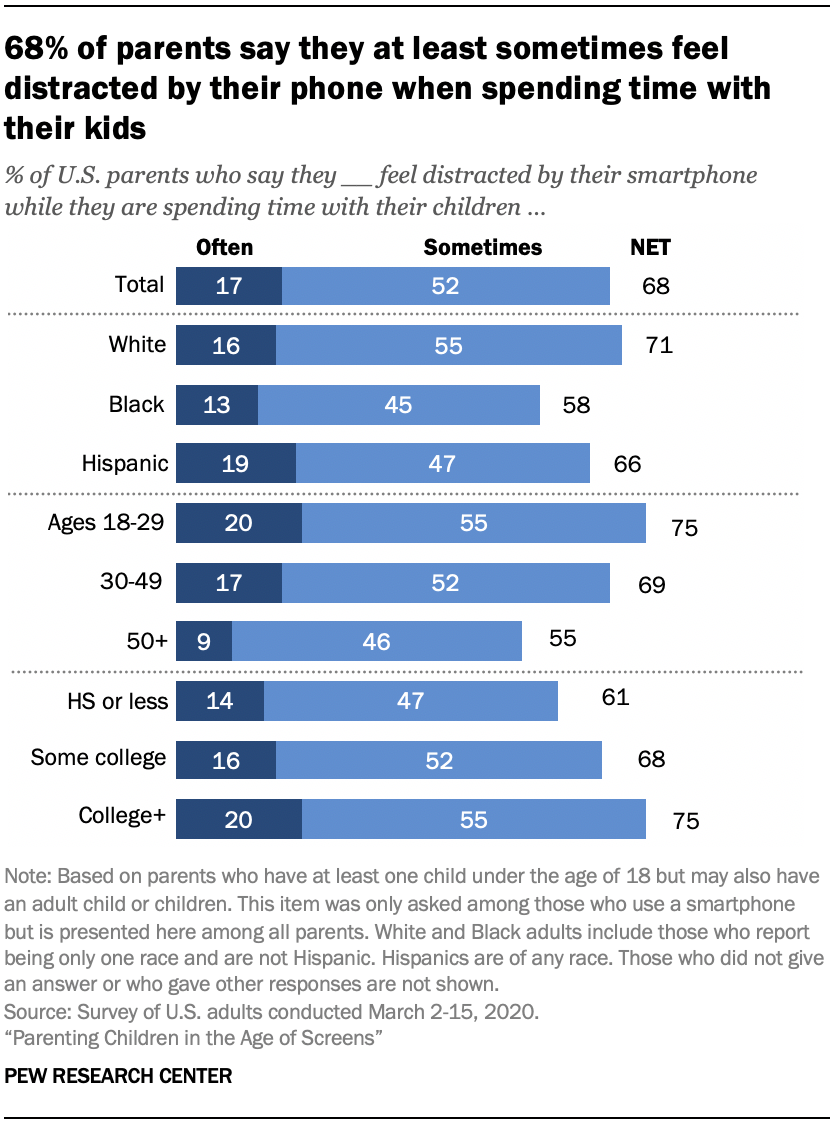
A majority of parents also report that their phone can get in the way of spending quality time with their children. Roughly seven-in-ten parents (68%) say they are at least sometimes distracted by their smartphone, with 17% saying this happens often.
Parents’ assessments of their technology use vary by age. For example, parents ages 18 to 49 are more likely than those ages 50 and older to say they spend too much time on their smartphone (59% vs. 36%). Similarly, parents under the age of 50 are more likely than those ages 50 and older to say they often or sometimes feel distracted by their smartphone when spending time with their children (70% vs. 55%).
There are also differences by educational attainment: Parents with a college degree or higher (59%) or those with some college experience (60%) are more likely than those with a high school education or less (47%) to say they spend too much time on their smartphones. When it comes to feeling distracted by their mobile device, 75% of parents with a college degree say they are least sometimes distracted by their phone when they are spending time with their kids, compared with 68% who have some college experiences and 61% of those who have a high school education or less.




